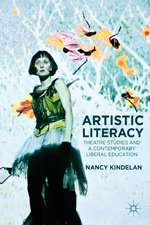3Qs: For broader education, the play's the thing

In a new book published this summer, “Artistic Literacy: Theatre Studies and a Contemporary Liberal Education,” associate professor Nancy Kindelan in the College of Arts, Media and Design makes the case for an increased role for theatre and the arts in undergraduate education. Northeastern University news office asked Kindelan about her book, the result of more than 12 years of research and writing.
You describe your book as a “call to action” for arts educators to play a stronger role in the development of undergraduate college curriculums. Why is this so important now?
It’s critical that the arts play a strong role in education, because they provide alternative ways to understand and express personal, social and ethical issues. However, they have had significant cuts in K-12 throughout the years. I’m now seeing students who come to the university who never had significant theatre experiences before, so why should they even look for a theatre experience now? They don’t even know it exists.
Regional theatres are also reporting that their audiences are going away. Their audiences are made up of people who are an advanced age, shall we say, and the concern is when they are gone, who will go to the theatre?
It seems to me that these three areas should be talking to each other because we are all interested in the same thing. We are all discussing issues of the importance of the arts as a powerful tool for dealing with social engagement, with the community that one is involved in, issues that relate to humanity and the human condition. This is where the arts began in ancient times and where theatre flourished more than 2,500 years ago in Greece, and we really have not left that. But in education in this country we’re finding it’s very difficult to embrace that idea.
What do arts educators need to do to bring the arts into a more prominent position in higher education?
My book deals with the importance of getting the arts back into the curriculums of institutions in innovative ways. The arts deal with what institutions are interested in: creativity, innovative thinking and practice, experiential learning, undergraduate research, entrepreneurship, collaboration and moving beyond silos. And it just so happens that my discipline, theatre, does that: we work that way, we develop things that undergraduates are interested in — but nobody knows it.
I think the reason why nobody knows it is because we haven’t come to the curriculum table. And as I have recently heard it said, “If you’re not at the curriculum table, you’re on the menu.” That’s something that concerns me quite a bit. We need to talk about what it is that we do and we need to talk about how we develop students who have what we call an enlightened eye, the ability to look at or listen to a work of art and understand what that piece is saying about our relationship to society, about who we are and our relationship to others.
How can theatre change undergraduate education, especially in disciplines that aren’t traditionally tied to liberal arts?
The plays we produce are written by playwrights who are interested in the human condition. So what we do, as actors, designers, technicians, collaborators, is mine that play and understand how that play illuminates not only the world and society of the time it was written, but also our contemporary world. And you cannot do that without engaging in interdisciplinary research.
I’m a director and a dramaturg, so I do that through creative research. This kind of applied research encourages deep thinking with our students — it’s not just performing, it’s asking questions like, “Why does the character do the things he or she does? Why don’t they do something else?” We’re really exploring moral issues, often, and in order to do that you have to be well-read in history, in political science, in other cultures, in philosophy and the list goes on. It embraces everything central to the university of today: critical thinking, creative thinking, interdisciplinary thinking, meaningful research and the exchange of ideas across fields.
I would call a play a case study of a particular group of people at a particular time. And creatively transferring that case study to the stage is, in a way, experiential learning. We take all we have learned, we develop it and we apply it to the production of a play so that a larger group of people can take that information and think about it, experience it and feel it. Hopefully that encourages social engagement and gets your audience talking about social issues.
Provided by Northeastern University





















